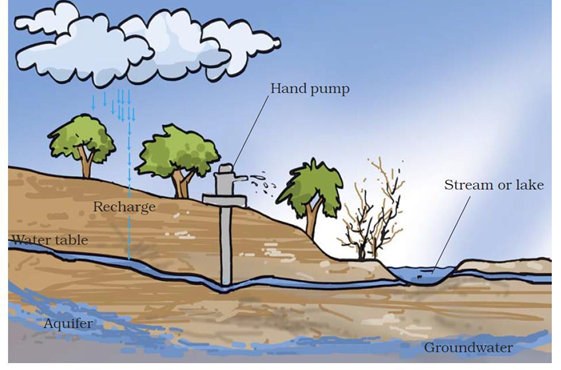NCERT Solutions for Class 7 Science Chapter 16 Water: A Precious Resource
NCERT Solutions for CBSE Class 7 Science Chapter 16 Water: A Precious Resource are given below. These solutions help students to clear their doubts and to obtain good marks in final exam. Class 7 Science NCERT questions and answers provided in this article are strictly based on the CBSE syllabus and curriculum.
Class 7 Science Chapter 16 Water A Precious Resource NCERT Solutions
Class 7 NCERT Solutions for Science Chapter 16 includes all the intext and exercise questions. All these questions are solved by experts with a detailed explanation that will help students complete their assignments and homework.
EXERCISES
Question 1: Mark ‘T’ if the statement is true and ‘F’ if it is false:
(a) The freshwater stored in the ground is much more than that present in the rivers and lakes of the world. (T/F)
(b) Water shortage is a problem faced only by people living in rural areas. (T/F)
(c) Water from rivers is the only source for irrigation in the fields. (T/F)
(d) Rain is the ultimate source of water. (T/F)
Answer: (a) The freshwater stored in the ground is much more than that present in the rivers and lakes of the world. (True)
(b) Water shortage is a problem faced only by people living in rural areas. (False)
(c) Water from rivers is the only source for irrigation in the fields. (False)
(d) Rain is the ultimate source of water. (True)
Question 2: Explain how groundwater is recharged?
Answer: Rain water and the water from water bodies on earth’s surface pass through the soil by the process of infiltration. The infiltrated water then gets accumulated in the aquifer deep under the ground. There are some layers of impermeable rocks which prevent the water in the aquifer from seeping down further. In this way, the ground water is recharged.
Question 3: There are ten tubewells in a lane of fifty houses. What could be the long term impact on the water table?
Answer: Ten tube-wells are too much for a lane of fifty houses, this can lead people to mindlessly exploit the groundwater. This can lead to depletion of the water table in the long run.
Question 4: You have been asked to maintain a garden. How will you minimise the use of water?
Answer: To maintain a garden, water is necessary. Therefore, to minimise the use of water, we can apply the drip irrigation method. In this method, water is supplied directly to the base of the plants using narrow pipes, thereby reducing the loss of water.
Question 5: Explain the factors responsible for the depletion of water table.
Answer: Following factors are responsible for depletion of water table:
(i) Increased population: Demand of water has been increased by the increased population. As the number of humans increase, the consumption of water also increases.
(ii) Increasing industries: All industries need water. As the number of human population increase, the number of industries are also increased which definitely increases the consumption of water.
(iii) Lack of water conservation techniques: Main source of water on earth and for the underground water is rain. The water of the rain, if conserved can increase the ground water level. But this is not done due to lack of water conservative techniques.
(iv) Agricultural activities: India is a country which depends on agriculture. The land used for cultivation has increased. So, the consumption of water for agriculture has increased. Irregular rainfall has increased the consumption of groundwater. This has increased the depletion of groundwater.
Question 6: Fill in the blanks with the appropriate answers:
(a) People obtain groundwater through _______ and ________.
(b) Three forms of water are ________, ________ and ________.
(c) The water bearing layer of the earth is ________.
(d) The process of water seepage into the ground is called ________.
Answer: (a) People obtain groundwater through wells and handpumps.
(b) Three forms of water are solid, liquid and gas.
(c) The water bearing layer of the earth is aquifier.
(d) The process of water seepage into the ground is called infiltration.
Question 7: Which one of the following is not responsible for water shortage?
(i) Rapid growth of industries
(ii) Increasing population
(iii) Heavy rainfall
(iv) Mismanagement of water resources
Answer: (iii) Heavy rainfall
Question 8: Choose the correct option. The total water
(i) in the lakes and rivers of the world remains constant.
(ii) under the ground remains constant.
(iii) in the seas and oceans of the world remains constant.
(iv) of the world remains constant.
Answer: (iv) of the world remains constant.
Question 9: Make a sketch showing groundwater and water table. Label it.
Answer:
